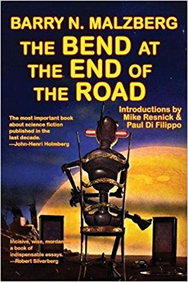THE BEND AT THE END OF THE ROAD

by Barry N. Malzberg
Fantastic Books
(www.FantasticBooks.biz)
2018, 161 pp., $13.99
ISBN 978-1-5154-1038-6
Click here to purchase
Barry Malzberg convinces us that, with SF at least, everything was always in upheaval, always questioned, always prodded and poked, and like any good literature, took some time to evolve from his first contact with the genre through a “love/hate/neutral relationship with SF,” Malzberg writes. “Forgetting its tropes and juvenile predictability.”
It’s all here, folks. The Malzberg soul. This is saying something special.
“Letting the Guns Bury Them” is from November 2008 and speaks about a period in the late 1950s when the SF field collapsed, literally, as the result of magazines going out of business. It’s a reference/homage to H. Beam Piper’s long guns collection. Piper, you see, committed suicide, and his ex-wife telegraphed this, according to Malzberg: “let the guns bury him.”
Rogers to his Hammerstein, Simon to his Garfunkel, Hall to his Oats, Malzberg writes about the heavy and traumatic influence of Dick Geis’s Science Fiction Review magazine in “What We Need.” I know what Malzberg means! I also read the incantations of Science Fiction Review and the Dick Geis alter-ego publication, his The Alien Critic. I remember the two as the greatest fanzines ever published, period. SFR was daunting, addictive, acerbic, hilarious, panic-inducing, thoughtful, exhilarating and oh-so-sincere about all that was SF.
(Sidebar: I loved Geis’s obsession with the Coming Economic Collapse of the World as We Know It. It was eye-opening fun, a true delight.)
Everybody -- we mean everybody involved in the field -- read SF Review and The Alien Critic. I should have made the connection long ago that Malzberg would be so partial to the pub. Were these guys in the same family? Cousins? Certain close colleagues who shared a common vision of what SF should be. Though Malzberg claims to have never met the man, I know that Geis, sadly, passed away several years ago. And I can tell Malzberg misses him.
However, Malzberg repeats himself far too much: about how the beginning of the end of a career in writing is when you have a column; his obsession with the life of Alfred Bester; but one repetition that I can wholeheartedly agree with: SF is suffering some sort of artistic and moral monad gestalt, like the heat death of its own universe, supplanted by the proliferation of fantasy worlds and milieus, commercialization and button-pushing.
But what is the purpose of these 50 or so essays?
I think the one theme that persists in these raves, rants and regrets: the genre continues to stare at its own bellybutton, yearning for a reason to exist. It exists, of course, as in the letter from an editor about one of his stories, as an escape for the pain and dreariness of a reader’s workday, but also, for a brief time at least, to make us feel just a little bit (or a lot more) transcendent.

